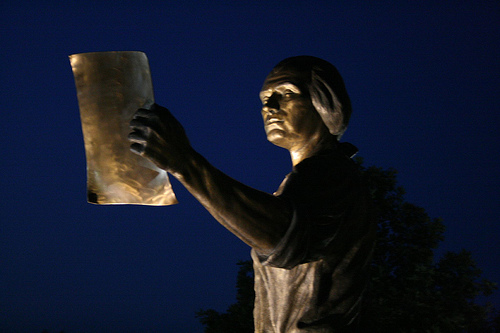That's why I'm interested in the case of Geert Wilders, the anti-Muslim Dutch politician on trial for saying nasty things about Islam. It's not the kind of trial that would take place in the United States, but other countries have rather stricter limits on free speech. Lots of American conservatives have weighed in on the issue, including this typical entry from National Review:
Wilders compares Islam to Nazism, a provocative stance, to be sure. But how should such provocative criticism be received? With open debate, or with the criminalization of opinion? It is extremely pertinent in the Wilders case to ask whether his trial means that Europe’s commitment to freedom is already dead.
On the face of it, I'm in agreement. Society is best served by letting Wilders criticize Islam; Islam should be more than capable of rhetorically defending itself. But here's the thing I don't see Wilders' defenders acknowledge: the freedom they advocate for him is the freedom he would take away from Muslims.
This is a man, after all, who has called for banning the Koran:
Madam Speaker, the Koran is a book that incites to violence. I remind the House that the distribution of such texts is unlawful according to Article 132 of our Penal Code. In addition, the Koran incites to hatred and calls for murder and mayhem. The distribution of such texts is made punishable by Article 137(e). The Koran is therefore a highly dangerous book; a book which is completely against our legal order and our democratic institutions. In this light, it is an absolute necessity that the Koran be banned for the defence and reinforcement of our civilisation and our constitutional state. I shall propose a second-reading motion to that effect.
That's not it, of course: Wilders has also called for a tax on Muslim women wearing headscarves and a ban on Mosque construction. Fundamentally, though, Wilders' defenders are invoking a freedom of expression for him that he would deny others.
That's not so shocking: Again, see the ACLU's defense of the KKK. What is shocking is that Wilders' defenders barely, if ever, acknowledge this tension. To read editorials like National Review's is to believe that Wilders has merely made some outrageous comments. In fact, he's advocated a course of action that would damage the freedom of Muslims living in his country.
Some American conservatives would, no doubt, suggest that Western societies are dooming themselves by letting radical Muslims take advantage of our traditions of openness. They're fine with some bit of double-standard, in other words, because the double-standard is supposedly needed to preserve the standard at all. It is stirring to see National Review unequivocally defend Wilders' right to speak his peace; when it comes to the rights of Muslims, however, there will always been room for debate.


